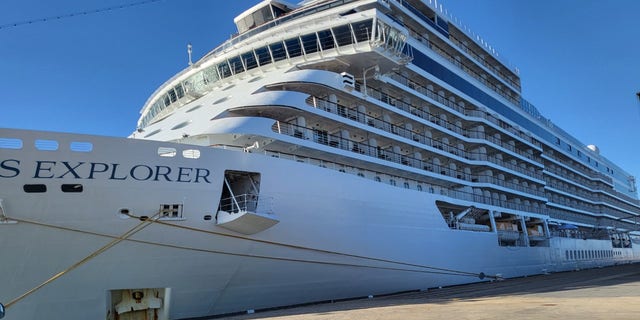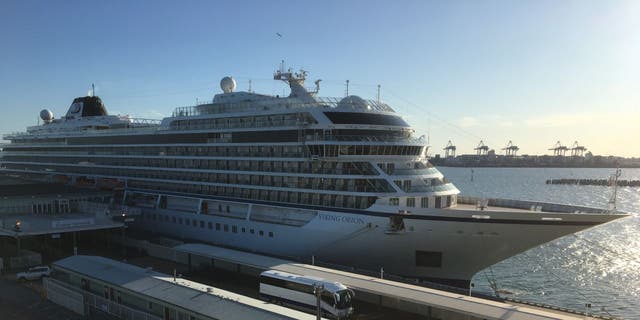Third Australian cruise in weeks turns into ‘nightmare’ after fungus outbreak prevents entry into New Zealand
A total of three cruise ships over the past few weeks in Australian waters have been denied entry into New Zealand and forced to change itineraries due to a buildup of marine fungus.
The Seven Seas Explorer, a luxury cruise ship in the Regent Seven Seas Cruises fleet, was denied entry in New Zealand waters this week due to what New Zealand described as “higher than allowed levels of algae, barnacles, tube worms, and potential oysters present” on the ship’s hull, RNZ reported.
The ship departed Sydney, Australia, on Dec. 29 with plans to make stops at eight ports and three fjords, and spend three days at sea, but an American passenger on the ship told Fox News Digital the trip “turned into a nightmare” and will now consist of 11 days at sea and only one port after the ship was required to wait in the open ocean for a cleaning crew to eradicate the marine life.
The passenger explained that the trip has become a frustrating ordeal with changing plans, inconsistent messaging from the crew, and uncertainty about being compensated for the derailed vacations.
VIKING POLARIS PASSENGERS SPEAK OUT AFTER ‘ROGUE WAVE’ STRIKES ANTARCTIC CRUISE SHIP, KILLING AMERICAN WOMAN
“We have been in limbo all day with land in sight, going nowhere,” the passenger said. “Very little information forthcoming and what we do hear keeps changing.”
“As an option to staying on board for the remainder of the cruise, we are now told that when we reach Adelaide, we may disembark and make our own plans to get home all at our own expense and nobody on board to assist us in plans,” the passenger said. “Regent Seven Seas claims their luxury cruises are ‘unrivaled experiences.’ This is not what we had in mind.”
TURKISH TIFFANY’S TYCOON DIES AFTER MYSTERIOUS FALL FROM CRUISE SHIP

A spokesperson for Regent Seven Seas cruises told Fox News Digital the ship is “currently sailing a 14-night cruise which guests embarked on Dec. 29, 2022, and are scheduled to disembark in Auckland, New Zealand, on Jan. 12, 2023.”
The company said it is “committed to working with our local partners across the globe to minimize our impact on the surrounding environment of the destinations we visit” and explained that local regulations in New Zealand required a cleaning of the Seven Seas Explorer’s hull.
“The cleaning must be carried out by a company recognized by New Zealand’s Ministry for Primary Industries, none of which have been available at ports the ship has recently visited or would have visited before its scheduled entry to New Zealand waters,” the spokesperson said.
The spokesperson said all guests on board have been offered 100% refund of their paid cruise only fare and “a number of guests chose to disembark in Adelaide to make their onward travels.”
CARNIVAL, CELEBRITY CRUISE CREWS RESCUE DOZENS OF MIGRANTS DRIFTING IN SMALL BOATS OFF FLORIDA, VIDEOS SHOW
“We understand and apologize for the inconvenience, frustration and disappointment this disruption has caused to our valued guests, and we appreciate their continued understanding,” the statement said.
Two additional cruise ships in recent weeks have failed to meet New Zealand’s environmental standards, including the 14-deck, 930-person cruise ship Viking Orion that was blocked from entering New Zealand ports and stranded for eight days at sea last week due to what the company told Fox News Digital was a “limited amount of standard marine growth.”
Viking Cruises confirmed to Reuters that it will provide passengers with a voucher equal to what they paid for the cruise.
Two weeks ago, a Princess Cruise Lines ship known as the Coral Princess was stopped from entering New Zealand due to a buildup of marine snails that resulted in an apology from the cruise line and a refund of roughly $100 to passengers and 15% off their next trip – an amount most on board were “not very happy with,” a passenger told the outlet.

The three cruise ships failed to meet New Zealand’s “biofouling standards,” which are designed to prevent invasive species from damaging reefs.
“If they make it to our reefs, they might decimate the environment and cause some serious issues,” Flinders University associate professor Sophie Leterme told AAP.
Paul Hallett, manager environmental health Biosecurity New Zealand, told Fox News Digital that “nearly 90 per cent of marine pests arrive in New Zealand on the submerged surfaces of international vessels” and “such pests can adversely impact New Zealand’s environment, unique marine ecosystems, aquaculture industry and economy.”
“It is incorrect to say that the three ships were denied entry to New Zealand,” Hallett continued. “Only the Coral Princess was initially denied entry – due to its high levels of a high-risk organism, snails. The Coral Princess was cleaned in the EEZ 77km off the coast of Tauranga, after which it was allowed to visit New Zealand.”
Hallet said the other ships were “allowed to visit approved ports, but not areas with special marine environments” such as Fiordland and “both visited approved ports in December, but were instructed to have biofouling removed before subsequent voyages to New Zealand.”
Read the full article Here


